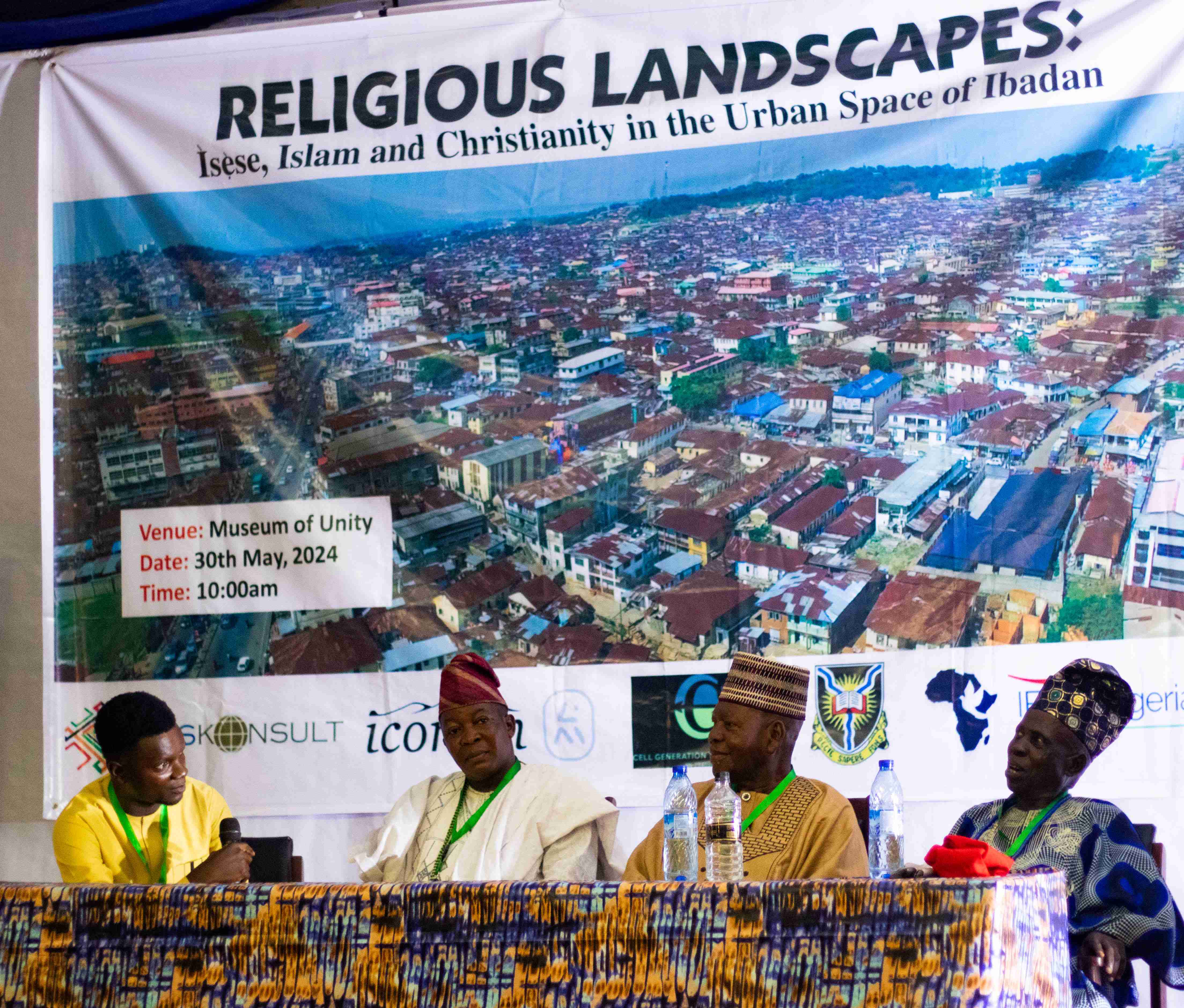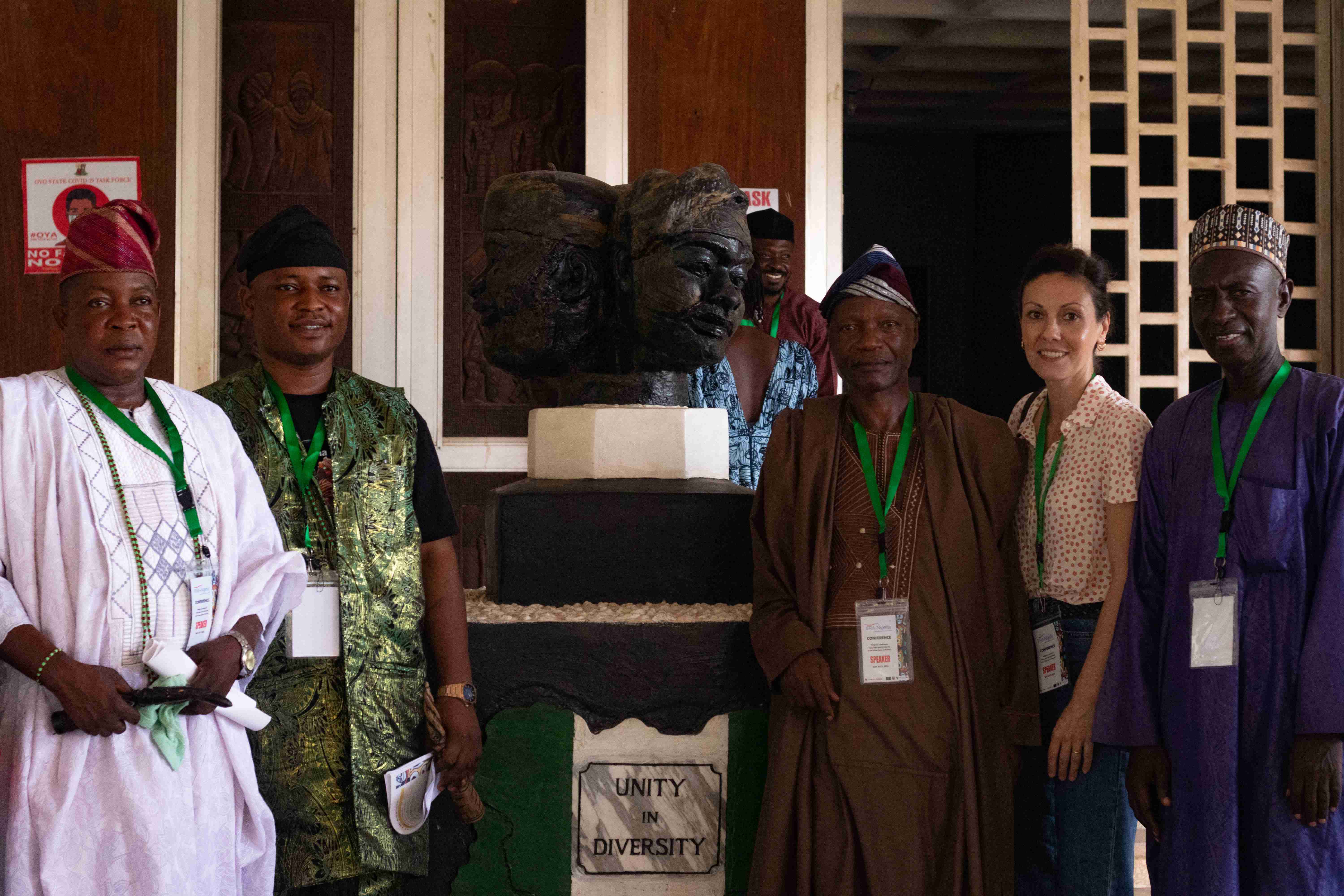Conference : Religious Landscapes: Isese, Islam and Christianity in the Urban Space of Ibadan
 On the 30th of May, a conference organised by IFRA-Nigeria titled “Religious Landscapes: Isese, Islam and Christianity in the Urban Space of Ibadan” on the 30th of May 2024 took place at the Museum of Unity of Ibadan. The conference hosted Professor R.O. Olaniyi of the Department of History, University of Ibadan, Professor Olufunke Adeboye also of the Department of History, University of Lagos and Mr Fatosin Awosola.
On the 30th of May, a conference organised by IFRA-Nigeria titled “Religious Landscapes: Isese, Islam and Christianity in the Urban Space of Ibadan” on the 30th of May 2024 took place at the Museum of Unity of Ibadan. The conference hosted Professor R.O. Olaniyi of the Department of History, University of Ibadan, Professor Olufunke Adeboye also of the Department of History, University of Lagos and Mr Fatosin Awosola.
Mr Awosola started the presentation of his topic on Isese and Religious Pluralism in Ibadan where he mentioned that every human was born an Isese adherent. He furthered that Isese is not just about the gods and deities alone but as long as one has parents and carries a head, their parents and head are deities worth worshipping and so qualifies them to be regarded as an Isese adherent. Mr Awosola in his presentation posited that Isese predates every other religion in Ibadan and that Isese has been more welcoming to the introduction other religions in Ibadan contrary to popular beliefs.
Professor Olaniyi took over with his presentation where he discussed Islam in the context of religious pluralism in Ibadan. Professor Olaniyi remarked that pluralism should not be misconstrued for inclusivism and exclusivism, he mentioned that Pluralism should also not be mistaken for plurality and that pluralism may be accepted to mean tolerance. He alluded that Islam made consistent strides forward after the British took control of Ibadan in 1893, as the Muslim community grew to become a sizable and influential force in the city. Furthermore, Professor Olaniyi noted that Oshundina, one of the Muslim chiefs in Ibadan, appeared to personify the stature of Islam by 1897 when this became remarkably apparent. Additionally, notable Yoruba Muslim elites were Baale Opeagbe, Baale Fijabi, and Sumonu Apampa. As Islam grew in the city of Ibadan, the need to contest the presence of traditional processions emerged especially as its adherents were in some instances part of these processions.
Conversely, the traditional religious institution nurtured animosity towards the growing influence of Islam within Ibadan city and thus in some cases led to heightened friction and at times physical confrontations. He concluded that Islam in Ibadan was one of the earliest social institution in the making of a significant influence on the political system in Ibadan. In the face of pluralism, religion has advanced the establishment of cross-religious practices to foster peace and solidarity and the erection of infrastructural facilities to advance knowledge and well-being. However, the religion continues to face hostility.
Subsequently, Professor Olufunke Adeboye took over the panel by discussing her topic which was on Christianity and Religious Pluralism in Ibadan. She introduced her topic and made grand statement that Christianity came to Ibadan through the Church Missionary Society (CMS) represented by the Rev. David Hinderer in 1853. In corroboration of Professor Olaniyi, she mentioned that Pluralism is not just diversity, not just tolerance, not relativism. To her, Pluralism is the ‘energetic engagement with diversity’, the ‘active seeking of understanding’ across boundaries, and the ‘encounter of commitments’. She posited that there exists two levels of diversity – Intra-religious and Inter-religious. With Intra-religious diversity in [Ibadan] Christianity existed among the different groups such as – Mainline Churches, African Independent Churches (AIC) and Pentecostal Churches. Inter-religious diversity can be classified as the boundaries between Christianity, Islam and Traditional Religion. How were these managed?
Borrowings across religious boundaries – Christians borrowing musical instruments from Traditional religion e.g. Gangan, Agogo, Sekere, Bata drums (Omele Ako, Omele Abo, Iya-Ilu). She concluded that religious diversity at some point became pluralism in Ibadan especially in first quarter of the 20th century. The more diverse the terrain became, the more difficult it was to manage it.


Social Media
Mailing List